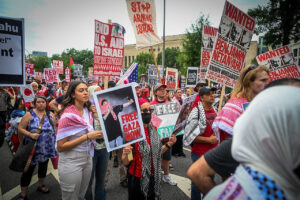‘The ICC’s findings so far have only scratched the surface’

Pro-Palestinian protesters in Washington demonstrate against Benjamin Netanyahu during his speech to the US Congress, 24 July 2024.
Mohammed R. Mhawish introduces an interview with Raji Sourani in +972 on 26 November 2024:
Last week, the International Criminal Court in The Hague issued arrest warrants for Israeli Prime Minister Benjamin Netanyahu and former Defense Minister Yoav Gallant. The court’s judges, in their November 21 ruling, found that there were reasonable grounds to believe that the pair were responsible for war crimes and crimes against humanity committed in the context of Israel’s ongoing war on Gaza — namely, using starvation as a method of warfare, as well as “murder, persecution, and other inhumane acts.”
The ICC’s judges issued an additional warrant for the arrest of Hamas’ military chief Mohammed Deif, whom the Israeli army claimed it killed in July but whose death Hamas never confirmed; the group insisted at the time that Deif survived the assassination attempt, but has reportedly since acknowledged that he likely died. The court’s chief prosecutor, Karim Khan, had also requested arrest warrants for Hamas leaders Ismail Haniyeh and Yahya Sinwar, but Israel subsequently killed both men, in August and October respectively.
The ICC launched a formal criminal investigation into war crimes and crimes against humanity in Israel-Palestine in 2021, when judges ruled that the court has jurisdiction over crimes committed in the occupied Palestinian territories and those committed by Palestinians inside Israel. The scope of the investigation dates back to 2014, but these warrants relate specifically to the period between Oct. 8, 2023, and May 20, 2024.
The decision also spells the defeat of an almost decade-long multi-agency Israeli campaign of surveillance and intimidation that aimed to thwart the ICC’s probe, which +972 Magazine and the Guardian revealed earlier this year.
To understand more about the significance of this ruling, +972 spoke with Raji Sourani, a human rights lawyer and director of the Gaza-based Palestinian Center for Human Rights (PCHR), one of several Palestinian human rights organizations that Israel surveilled while it provided testimony to the chief prosecutor’s office. In the following conversation, Sourani — who is currently based in Cairo, after fleeing the genocide in Gaza — unpacks the legal and political ramifications of the ICC’s decision, its historical context, and what it means for accountability in the ongoing Israeli assault on the Strip.
The interview has been edited for length and clarity.
Can you break down what it means that the ICC has issued arrest warrants for Netanyahu and Gallant?
The decision to issue these warrants after a meticulous legal review signals the seriousness of the charges. It affirms allegations of Netanyahu and Gallant bearing responsibility for war crimes and crimes against humanity, particularly the use of starvation as a weapon of war and the intentional targeting of civilians in Gaza.
However, as significant as this step is, enforcement remains the ICC’s Achilles’ heel. While it has the authority to prosecute crimes of this magnitude, the court has no independent police or military force to execute these warrants. It relies entirely on its 124 member states, who are signatories to the Rome Statute [the court’s founding treaty], to act as its enforcers, arresting suspects within their borders. While this is a legal obligation under international law, enforcement is often subject to the political will of these states.
